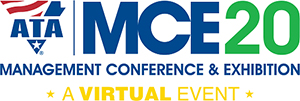Senior Reporter
FMCSA Endures Busy, Challenging Year, Agency’s Top Official Says

[Stay on top of transportation news: Get TTNews in your inbox.]
It’s been a busy but productive year for Federal Motor Carrier Safety Administration officials, despite complications presented by the COVID-19 pandemic, a top agency official said at an Oct. 23 update session during American Trucking Associations’ Management Conference & Exhibition.
This year, the agency has been forced to issue a variety of regulatory waivers, declarations and extensions to keep the trucking economy moving during the pandemic, but still has made progress moving along a number of significant programs and rulemakings, Deputy Administrator Wiley Deck said.
They range from the implementation last month of an hours-of-service rule adding flexibility for drivers to opening up the Drug and Alcohol Clearinghouse earlier this year that already has posted 42,000 drug test failures that Deck said has prevented driver hires or taken existing drivers using drugs off the highways. The Clearinghouse currently has registered 1.5 million users and has received more than 2 million queries, he said.
But there have been challenges, not the least of which has been finding 18- to 20-year-old military drivers for a pilot program that began last summer to mitigate the driver shortage.
“We are struggling in trying to get drivers,” Deck said. “We’ve engaged the National Guard, the Reserves, even gone out to speak to large classes of drivers being trained at various facilities around the country. But we just haven’t made any headway on it.”
RELATED: FMCSA Proposes Expanding Specialties for Military Driver Pilot Program
Just last month, FMCSA proposed a possible second pilot program to allow nonmilitary commercial driver license holders from 18 to 20 years old with significant intrastate driving experience to be permitted to operate in interstate commerce.
Also last month, the agency proposed a split-duty period pilot program that would allow drivers to pause their 14-hour on-duty period to a single off-duty period of 30 minutes and up to three hours.
But Deck said the agency has been challenged to find ways to merge what elite transportation researchers have called a more precise, but complex, data-driven method — known as the Item Response Theory — intended to improve the evaluation of driver and motor carrier safety. FMCSA has been studying the IRT method for more than two years, but missed its deadline for a go or no-go decision last month. FMCSA has been working with a National Academy of Sciences standing committee and is finalizing a review of the models and developing options. Deck said an announcement will be made soon.

Home | Video | Heroes' Photo Gallery
Saluting the men and women of the trucking industry who kept America's essential goods flowing during the coronavirus pandemic.
Heroes: Peter Lacoste | Susan Dawson | James Rogers | Reggie Barrows | Kevin Cooper | Cesar Quintana Moreno
“But I can’t really explain it without the guys in the lab coats,” Deck joked.
Deck also updated progress on a number of other agency initiatives, including:
- Full implementation of the Entry-Level Driver Training program still is being delayed until February 2022. However, the agency next summer plans to launch its registration site of training providers.
- The agency’s crash preventability program has received more than 9,000 requests from carriers to classify crashes as nonpreventable when a driver was not at fault. About 26% of those requests have not been declared as noneligible, but 97% of those accepted have been ruled as not preventable.
- The agency is moving along on its plans to create a panel of commercial vehicle drivers to give feedback to FMCSA’s Motor Carrier Safety Advisory Committee on driver-related issues.
- FMCSA is planning an Oct. 28 public broker listening session to discuss petitions filed by three trade groups on broker issues.
- Concerned with an uptick over the past several years in truck-involved fatal crashes, the agency made a request for information in January to move ahead in planning a new Large Truck Crash Causal Factors Study. The last such major study was 17 years ago, and Deck said that the industry has changed dramatically since then and that more information on why truck crashes occur is needed.
Want more news? Listen to today's daily briefing:
Subscribe: Apple Podcasts | Spotify | Amazon Alexa | Google Assistant | More





